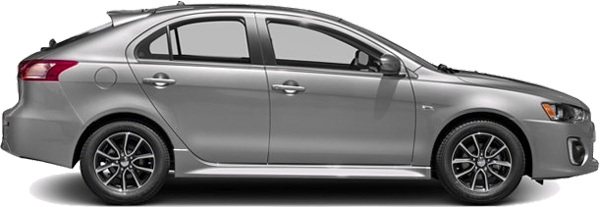The Comparative Analysis :
Mitsubishi Lancer Sportback 1.8 CVT-Automatic (15 - 17) vs. Hyundai i30 Fastback 1.0 T-GDI (17 - 18)
€ 23,000

€ 22,200

€ 23,000
Base Price ⓘBase price of a new vehicle with standard equipment in Germany at market launch.
€ 22,200
ⓘBase price of a new vehicle with standard equipment in Germany at market launch. Price Info
Vehicle Dimensions
The dimensions of these vehicles differ considerably. The Mitsubishi Lancer Sportback 1.8 is 5.1 inches longer, 1.4 inches narrower and 3.5 inches taller than the Hyundai i30 Fastback 1.0 T-GDI.
Mitsubishi Lancer Sportback 1.8
Hyundai i30 Fastback 1.0 T-GDI
59.6
69.3
80.5
56.1
70.7
80.7
69.3 in
Width
70.7 in
80.5 in
Width Incl. Mirrors
80.7 in
59.6 in
Height
56.1 in
103.7
180.5
104.3
175.4
180.5 in
Length
175.4 in
103.7 in
Wheelbase
104.3 in
Vehicle Weight
Mitsubishi Lancer Sportback 1.8
Hyundai i30 Fastback 1.0 T-GDI
3219 lb
Curb Weight
2903 lb
4189 lb
Gross Vehicle
Weight
Weight
4012 lb

Weight Difference:
315 lb
9.79 %

General
Mitsubishi Lancer Sportback 1.8
Hyundai i30 Fastback 1.0 T-GDI
CY0
Generation
PDE
Hatchback
Car Body Style
Hatchback
Mid-Grade Unleaded
Fuel Type
Mid-Grade Unleaded

Front-wheel drive
Drivetrain
Front-wheel drive

Continuously variable transmission (CVT)
Transmission
6-speed manual transmission
Engine
Mitsubishi Lancer Sportback 1.8
Hyundai i30 Fastback 1.0 T-GDI
Straight-four gasoline engine (naturally aspirated engine)
Engine Type
Straight-three gasoline engine with turbocharger
4
Valves
4
4
Cylinders
3
1.8 L / 88 cu in
Displacement
1 L / 49 cu in
138 hp
at 6000 rpm
Power
118 hp
at 6000 rpm
Mitsubishi Lancer Sportback 1.8
138 hp
118 hp
Hyundai i30 Fastback 1.0 T-GDI
130 lb‑ft
at 4250 rpm
Max. Torque
126 lb‑ft
at 1500 rpm
Mitsubishi Lancer Sportback 1.8
130 lb‑ft
126 lb‑ft
Hyundai i30 Fastback 1.0 T-GDI
Performance
Mitsubishi Lancer Sportback 1.8
Hyundai i30 Fastback 1.0 T-GDI
114 mph
Maximum Speed
117 mph
12.2 sec
Acceleration 0 to 62 mph
11.5 sec
62 mph
62
mph
mph
554 ft
0.000 sec

Mitsubishi Lancer Sportback 1.8
62 mph
62
mph
mph
525 ft
0.000 sec

Hyundai i30 Fastback 1.0 T-GDI
▶ REPLAY
23.33 lb/hp
Weight-to-Power Ratio
24.6 lb/hp
Mitsubishi Lancer Sportback 1.8
23.33 lb/hp
24.6 lb/hp
Hyundai i30 Fastback 1.0 T-GDI
Fuel Economy / Emissions
Mitsubishi Lancer Sportback 1.8
Hyundai i30 Fastback 1.0 T-GDI
Fuel Economy
36 mpg
combined
45 mpg
Mitsubishi Lancer Sportback 1.8
36 mpg
45 mpg
Hyundai i30 Fastback 1.0 T-GDI
27 mpg
city
39 mpg
44 mpg
highway
51 mpg
15.6 gal
Fuel Tank Capacity
13.2 gal
556 mi
Range
598 mi
Mitsubishi Lancer Sportback 1.8
556 mi
598 mi
Hyundai i30 Fastback 1.0 T-GDI
Environmental Impact
125 kWh
Total Energy Consumption
per 100 miles ⓘThe total energy consumption per 100 miles is the amount of energy consumed by a vehicle when burning fuel or using electricity per 100 miles (final energy), and the energy required to produce the appropriate amount of fuel or electricity (primary energy).
per 100 miles ⓘThe total energy consumption per 100 miles is the amount of energy consumed by a vehicle when burning fuel or using electricity per 100 miles (final energy), and the energy required to produce the appropriate amount of fuel or electricity (primary energy).
98.5 kWh
Mitsubishi Lancer Sportback 1.8
125 kWh
98.5 kWh
Hyundai i30 Fastback 1.0 T-GDI
Euro 6b (NEFZ)
Emission Standard
Euro 6b (NEFZ)
246 g/mi (NEFZ)
CO2 Emissions
193 g/mi (NEFZ)
Practical Convenience
Mitsubishi Lancer Sportback 1.8
Hyundai i30 Fastback 1.0 T-GDI
5
Doors
5
5
No. of Seats
5
970 lb
Maximum Payload
1109 lb
8.2 cu ft
Trunk Volume
12.7 cu ft







38.2 cu ft
Cargo Volume (Seats Down)
38.3 cu ft




















